 Libri di Wilson Edward O. su Unilibro.it
)
Libri di Wilson Edward O. su Unilibro.it
)
|
|
1913 |
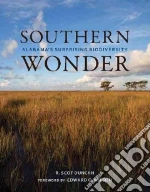 Title :
Southern Wonder
Title :
Southern WonderAuthor: Duncan R. Scot, Wilson Edward O. (FRW) Publisher: Univ of Alabama Pr Southern Wonder explores Alabama’s amazing biological diversity, the reasons for the large number of species in the state, and the importance of their preservation. Alabama ranks fifth in the nation in number of species of plants and animals found in the state, surpassed only by the much larger western states of California,Texas, Arizona, and New Mexico. When all the species of birds, trees, mammals, reptiles, amphibians, fishes, wildflowers, dragonflies, tiger beetles, and ants are tallied, Alabama harbors more species than 90 percent of the other states in the United States. Alabamais particularly rich in aquatic biodiversity, leading the nation in species of freshwater fishes, turtles, mussels, crayfish, snails, damselflies, and carnivorous plants. The state also hosts an exceptional number of endemic species—those not found beyond its borders—ranking seventh in the nation with 144 species. The state’s 4,533 species, with more being inventoried and discovered each year, are supported by no less than 64 distinct ecological systems—each a unique blend of soil, water, sunlight, heat, and natural disturbance regimes. Habitats include dry forests, moist forests, swamp forests, sunny prairies, grassy barrens, scorching glades, rolling dunes, and bogs filled with pitcher plants and sundews. The state also includes a region of subterranean ecosystems that are more elaborate and species rich than any other place on the continent. Although Alabama is teeming with life, the state’s prominence as a refuge for plants and animals is poorly appreciated. Even among Alabama’s citizens, few outside a small circle of biologists, advocates, and other naturalists understand the special quality of the state’s natural heritage. R. Scot Duncan rectifies this situation in Southern Wonder by providing a well-written, comprehensive overview that the general public, policy makers, and teachers can understand and use. Readers are taken on an exploratory journey of the state’s varied landscapes—from the Tennessee River Valley to the coastal dunes—and are introduced to remarkable species, such as the cave salamander and the beach mouse. By interweaving the disciplines of ecology, evolution, meteorology, and geology into an accessible whole, Duncan explains clearly why Alabama is so biotically rich and champions efforts for its careful preservation. Published in Cooperation with The Nature Conservancy € 26,80
|
 Title :
Letters to a Young Scientist
Title :
Letters to a Young ScientistAuthor: Wilson Edward O. Publisher: Liveright Pub Corp Edward O. Wilson has distilled sixty years of teaching into a book for students, young and old. Reflecting on his coming-of-age in the South as a Boy Scout and a lover of ants and butterflies, Wilson threads these twenty-one letters, each richly illustrated, with autobiographical anecdotes that illuminate his career—both his successes and his failures—and his motivations for becoming a biologist. At a time in human history when our survival is more than ever linked to our understanding of science, Wilson insists that success in the sciences does not depend on mathematical skill, but rather a passion for finding a problem and solving it. From the collapse of stars to the exploration of rain forests and the oceans’ depths, Wilson instills a love of the innate creativity of science and a respect for the human being’s modest place in the planet’s ecosystem in his readers. € 19,60
|
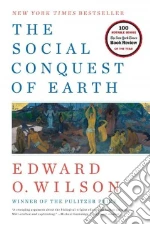 Title :
The Social Conquest of Earth
Title :
The Social Conquest of EarthAuthor: Wilson Edward O. Publisher: Liveright Pub Corp Sparking vigorous debate in the sciences, The Social Conquest of Earth upends “the famous theory that evolution naturally encourages creatures to put family first” (Discover). Refashioning the story of human evolution, Wilson draws on his remarkable knowledge of biology and social behavior to demonstrate that group selection, not kin selection, is the premier driving force of human evolution. In a work that James D. Watson calls “a monumental exploration of the biological origins of the human condition,” Wilson explains how our innate drive to belong to a group is both a “great blessing and a terrible curse” (Smithsonian). Demonstrating that the sources of morality, religion, and the creative arts are fundamentally biological in nature, the renowned Harvard University biologist presents us with the clearest explanation ever produced as to the origin of the human condition and why it resulted in our domination of the Earth’s biosphere. € 16,10
|
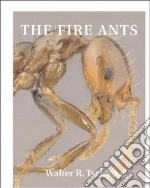 Title :
The Fire Ants
Title :
The Fire AntsAuthor: Tschinkel Walter R., Wilson Edward O. (FRW) Publisher: Belknap Pr Walter Tschinkel's passion for fire ants has been stoked by over thirty years of exploring the rhythm and drama of Solenopsis invicta's biology. Since South American fire ants arrived in Mobile, Alabama, in the 1940s, they have spread to become one of the most reviled pests in the Sunbelt. In Fire Ants Tschinkel provides not just an encyclopedic overview of S. invicta--how they found colonies, construct and defend their nests, forage and distribute food, struggle among themselves for primacy, and even relocate entire colonies--but a lively account of how research is done, how science establishes facts, and the pleasures and problems of a scientific career. Between chapters detailed enough for experts but readily accessible to any educated reader, 'interludes' provide vivid verbal images of the world of fire ants and the people who study them. Early chapters describe the several failed, and heavily politically influenced, eradication campaigns, and later ones the remarkable spread of S. invicta's 'polygyne' form, in which nests harbor multiple queens and colonies reproduce by 'budding.' The reader learns much about ants, the practice of science, and humans' role in the fire ant's North American success. € 32,90
|
 Title :
Stalking the Plumed Serpent
Title :
Stalking the Plumed SerpentAuthor: Means D. Bruce, Wilson Edward O. (FRW) Publisher: Ingram Pub Services Based on his more than 40 years of field research, Means, an expert on the eastern diamondback rattlesnake, reveals the biological complexity and beauty of the animals he has studied. In Australia, Means searches for the fiercey, reputed to be the world’s deadliest terrestrial snake. In Mexico, he stalks the rattlesnake that might have served as the model for the mythical plumed serpent of Mayan art. In Florida, he is chased by cottonmouth moccasins. Through his experiences, Means hopes that readers will gain a new appreciation for animals called herps, or creepy-crawly things. € 15,20
|
|
|
2013 |
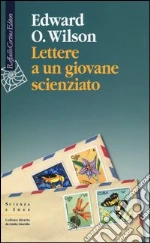 Title :
Lettere a un giovane scienzato
Title :
Lettere a un giovane scienzatoAuthor: Wilson Edward O. Publisher: Raffaello Cortina Editore Ispirandosi alle 'Lettere a un giovane poeta' di Rilke, Edward Wilson, il creatore delia sociobiologia, condensa qui sessant'anni di ricerca e didattica. Ci offre ventun lettere, ognuna arricchita di belle illustrazioni, dense di aneddoti autobiografici che illuminano la sua carriera e le sue profonde motivazioni a diventare un biologo. Il successo nella scienza dipende non tanto da abilità matematiche o da un elevato quoziente d'intelligenza quanto dalla passione che spinge a individuare un problema e a impegnarsi nella sua soluzione. Dal collasso delle stelle all'esplorazione delle foreste pluviali, dalla struttura dei fondi oceanici alla 'società delle formiche', Wilson instilla nel lettore l'amore per le infinite meraviglie della natura e il rispetto per l'umile posto che l'essere umano occupa nell'ecosistema del pianeta. € 21,00
Scontato: € 19,95
|
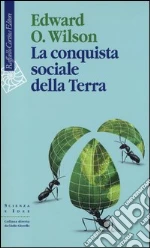 Title :
La conquista sociale della terra
Title :
La conquista sociale della terraAuthor: Wilson Edward O.; Pievani T. (cur.) Publisher: Raffaello Cortina Editore Nel volume l'autore delinea lo sviluppo di Homo sapiens dallo stadio iniziale alle più importanti conquiste creative. Nel rielaborare la storia dell'evoluzione umana, attinge alla sua straordinaria conoscenza della biologia e del comportamento sociale per illustrare l'origine della nostra condizione attraverso una limpida e incalzante narrazione. Wilson mostra come, dagli insetti sociali all'uomo, l'evoluzione non sia stata sospinta solo dall'egoismo genetico e dalla competizione individuale, ma anche dallo sviluppo di comportamenti sociali e cooperativi sempre più elaborati all'interno dei gruppi. È stata una forza evolutiva a guidare la conquista sociale della Terra da parte dell'uomo. Ora però abbiamo accelerato a tal punto, attraverso una crescita non regolamentata e incondizionata, da minacciare il pianeta così come lo conosciamo. 'La conquista sociale della Terra' presenta una provocatoria teoria delle nostre origini che delinea l'evoluzione del vivente 'da un inizio tanto semplice' all'attuale e pericolosa 'civiltà delle Guerre Stellari'. € 26,00
Scontato: € 24,70
|
|
1912 |
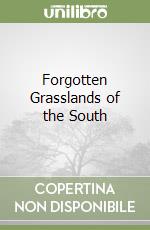 Title :
Forgotten Grasslands of the South
Title :
Forgotten Grasslands of the SouthAuthor: Noss Reed F., Wilson Edward O. (FRW) Publisher: Island Pr € 42,50
|
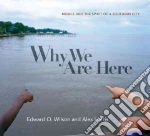 Title :
Why We Are Here
Title :
Why We Are HereAuthor: Wilson Edward O., Harris Alex Publisher: Liveright Pub Corp Entranced by Edward O. Wilson’s mesmerizing evocation of his Southern childhood in The Naturalist and Anthill, Alex Harris approached the scientist about collaborating on a book about Wilson’s native world of Mobile, Alabama. Perceiving that Mobile was a city small enough to be captured through a lens yet old enough to have experienced a full epic cycle of tragedy and rebirth, the photographer and the naturalist joined forces to capture the rhythms of this storied Alabama Gulf region through a swirling tango of lyrical words and breathtaking images. With Wilson tracing his family’s history from the Civil War through the Depression—when mule-driven wagons still clogged the roads—to Mobile’s racial and environmental struggles to its cultural triumphs today, and with Harris stunningly capturing the mood of a radically transformed city that has adapted to the twenty-first century, the book becomes a universal story, one that tells us where we all come from and why we are here. € 37,00
|
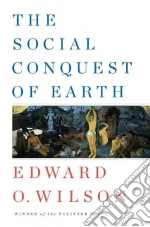 Title :
The Social Conquest of Earth
Title :
The Social Conquest of EarthAuthor: Wilson Edward O. Publisher: Liveright Pub Corp Where did we come from? Whatare we? Where are we going? In a generational work of clarity and passion, oneof our greatest living scientists directly addresses these three fundamentalquestions of religion, philosophy, and science while “overturning the famoustheory that evolution naturally encourages creatures to put family first” (Discover magazine). Refashioning the story of human evolutionin a work that is certain to generate headlines, Wilson draws on his remarkableknowledge of biology and social behavior to show that group selection, not kinselection, is the primary driving force of human evolution. He proves thathistory makes no sense without prehistory, and prehistory makes no sensewithout biology. Demonstrating that the sources of morality, religion, and thecreative arts are fundamentally biological in nature, Wilson presents us withthe clearest explanation ever produced as to the origin of the human conditionand why it resulted in our domination of the Earth's biosphere. € 25,00
|
|
1911 |
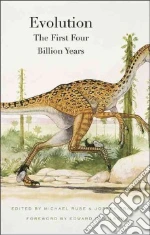 Title :
Evolution
Title :
EvolutionAuthor: Ruse Michael (EDT), Travis Joseph (EDT), Wilson Edward O. (FRW) Publisher: Belknap Pr Spanning evolutionary science from its inception to its latest findings, from discoveries and data to philosophy and history, this book is the most complete, authoritative, and inviting one-volume introduction to evolutionary biology available. Clear, informative, and comprehensive in scope, Evolution opens with a series of major essays dealing with the history and philosophy of evolutionary biology, with major empirical and theoretical questions in the science, from speciation to adaptation, from paleontology to evolutionary development (evo devo), and concluding with essays on the social and political significance of evolutionary biology today. A second encyclopedic section travels the spectrum of topics in evolution with concise, informative, and accessible entries on individuals from Aristotle and Linneaus to Louis Leakey and Jean Lamarck; from T. H. Huxley and E. O. Wilson to Joseph Felsenstein and Motoo Kimura; and on subjects from altruism and amphibians to evolutionary psychology and Piltdown Man to the Scopes trial and social Darwinism. Readers will find the latest word on the history and philosophy of evolution, the nuances of the science itself, and the intricate interplay among evolutionary study, religion, philosophy, and society. Appearing at the beginning of the Darwin Year of 2009—the 200th anniversary of the birth of Charles Darwin and the 150th anniversary of the publication of the Origin of Species—this volume is a fitting tribute to the science Darwin set in motion. € 27,70
|
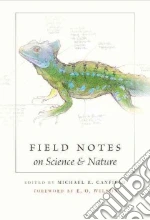 Title :
Field Notes on Science & Nature
Title :
Field Notes on Science & NatureAuthor: Canfield Michael R. (EDT), Wilson Edward O. (FRW) Publisher: Harvard Univ Pr Once in a great while, as the New York Times noted recently, a naturalist writes a book that changes the way people look at the living world. John James Audubon's Birds of America, published in 1838, was one. Roger Tory Peterson's 1934 Field Guide to the Birds was another. How does such insight into nature develop? Pioneering a new niche in the study of plants and animals in their native habitat, Field Notes on Science and Nature allows readers to peer over the shoulders and into the notebooks of a dozen eminent field workers, to study firsthand their observational methods, materials, and fleeting impressions. What did George Schaller note when studying the lions of the Serengeti? What lists did Kenn Kaufman keep during his 1973 “big year”? How does Piotr Naskrecki use relational databases and electronic field notes? In what way is Bernd Heinrich's approach “truly Thoreauvian,” in E. O. Wilson's view? Recording observations in the field is an indispensable scientific skill, but researchers are not generally willing to share their personal records with others. Here, for the first time, are reproductions of actual pages from notebooks. And in essays abounding with fascinating anecdotes, the authors reflect on the contexts in which the notes were taken. Covering disciplines as diverse as ornithology, entomology, ecology, paleontology, anthropology, botany, and animal behavior, Field Notes offers specific examples that professional naturalists can emulate to fine-tune their own field methods, along with practical advice that amateur naturalists and students can use to document their adventures. € 42,50
|
|
2011 |
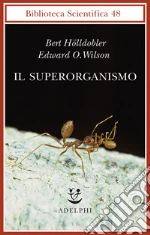 Title :
Il Superorganismo
Title :
Il SuperorganismoAuthor: Hölldobler Bert; Wilson Edward O. Publisher: Adelphi L'idea di una società coesa e solidale, retta da regole inflessibili, dove ciascuno ha un compito ben definito e nulla è lasciato al caso - simile dunque a un meccanismo perfetto che si muova sulla scena globale come un tutt'uno -, ha sempre affascinato i filosofi, e spesso gli insetti sociali sono stati assunti come modello anche per gli umani. Saggiamente, nel celebrare 'la bellezza, l'eleganza e la stranezza delle società degli insetti', Hölldobler e Wilson si astengono da arbitrarie, quanto scontate, estrapolazioni sociopolitiche e restano saldamente ancorati all'ambito che è loro più congeniale, quello della natural history, la biologia sul campo. A differenza dei biologi di orientamento teorico-sperimentale, condividono infatti il gusto per l'osservazione della natura e la minuziosa raccolta di dettagli, unicamente motivati dalla passione per il proprio soggetto. E di questa indagine è frutto 'Il superorganismo', destinato a modificare radicalmente il nostro modo di guardare le società degli insetti. Protagoniste sono, ancora una volta, le formiche. Presso questi animali prodigiosi - come presso gli altri insetti 'eusociali', api e termiti - la divisione del lavoro è così rigorosa da non risparmiare neppure i neonati o la funzione riproduttiva: da un lato la regina madre e gli inoffensivi maschi addetti all'inseminazione, dall'altro la casta delle operaie sterili dedite alla cura della prole regale o impiegate in missioni ad alto rischio. € 55,00
Scontato: € 52,25
|
|
|
1910 |
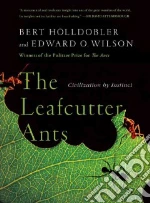 Title :
The Leafcutter Ants
Title :
The Leafcutter AntsAuthor: Holldobler Bert, Wilson Edward O. Publisher: W W Norton & Co Inc The Leafcutter Ants is the most detailed and authoritative description of any ant species ever produced. With a text suitable for both a lay and a scientific audience, the book provides an unforgettable tour of Earth's most evolved animal societies. Each colony of leafcutters contains as many as five million workers, all the daughters of a single queen that can live over a decade. A gigantic nest can stretch thirty feet across, rise five feet or more above the ground, and consist of hundreds of chambers that reach twenty-five feet below the ground surface. Indeed, the leafcutters have parlayed their instinctive civilization into a virtual domination of forest, grassland, and cropland—from Louisiana to Patagonia. Inspired by a section of the authors' acclaimed The Superorganism, this brilliantly illustrated work provides the ultimate explanation of what a social order with a half-billion years of animal evolution has achieved. € 17,90
|
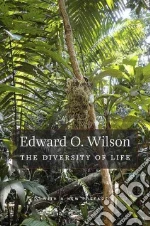 Title :
The Diversity of Life
Title :
The Diversity of LifeAuthor: Wilson Edward O. Publisher: Belknap Pr View a collection of videos on Professor Wilson entitled 'On the Relation of Science and the Humanities' 'In the Amazon Basin the greatest violence sometimes begins as a flicker of light beyond the horizon. There in the perfect bowl of the night sky, untouched by light from any human source, a thunderstorm sends its premonitory signal and begins a slow journey to the observer, who thinks: the world is about to change.' Watching from the edge of the Brazilian rain forest, witness to the sort of violence nature visits upon its creatures, Edward O. Wilson reflects on the crucible of evolution, and so begins his remarkable account of how the living world became diverse and how humans are destroying that diversity. Wilson, internationally regarded as the dean of biodiversity studies, conducts us on a tour through time, traces the processes that create new species in bursts of adaptive radiation, and points out the cataclysmic events that have disrupted evolution and diminished global diversity over the past 600 million years. The five enormous natural blows to the planet (such as meteorite strikes and climatic changes) required 10 to 100 million years of evolutionary repair. The sixth great spasm of extinction on earth--caused this time entirely by humans--may be the one that breaks the crucible of life. Wilson identifies this crisis in countless ecosystems around the globe: coral reefs, grasslands, rain forests, and other natural habitats. Drawing on a variety of examples such as the decline of bird populations in the United States, the extinction of many species of freshwater fish in Africa and Asia, and the rapid disappearance of flora and fauna as the rain forests are cut down, he poignantly describes the death throes of the living world's diversity--projected to decline as much as 20 percent by the year 2020. All evidence marshaled here resonates through Wilson's tightly reasoned call for a spirit of stewardship over the world's biological wealth. He makes a plea for specific actions that will enhance rather than diminish not just diversity but the quality of life on earth. Cutting through the tangle of environmental issues that often obscure the real concern, Wilson maintains that the era of confrontation between forces for the preservation of nature and those for economic development is over; he convincingly drives home the point that both aims can, and must, be integrated. Unparalleled in its range and depth, Wilson's masterwork is essential reading for those who care about preserving the world biological variety and ensuring our planet's health. € 27,10
|
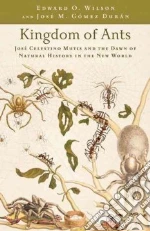 Title :
Kingdom of Ants
Title :
Kingdom of AntsAuthor: Wilson Edward O., Gomez Duran Jose Maria Publisher: Johns Hopkins Univ Pr One of the earliest New World naturalists, José Celestino Mutis began his professional life as a physician in Spain and ended it as a scientist and natural philosopher in modern-day Colombia. Drawing on new translations of Mutis's nearly forgotten writings, this fascinating story of scientific adventure in eighteenth-century South America retrieves Mutis's contributions from obscurity. In 1760, the 28-year-old Mutis -- newly appointed as the personal physician of the Viceroy of the New Kingdom of Granada -- embarked on a 48-year exploration of the natural world of northern South America. His thirst for knowledge led Mutis to study the region's flora, become a professor of mathematics, construct the first astronomical observatory in the Western Hemisphere, and amass one of the largest scientific libraries in the world. He translated Newton's writings and penned essays about Copernicus; lectured extensively on astronomy, geography, and meteorology; and eventually became a priest. But, as two-time Pulitzer Prize--winner Edward O. Wilson and Spanish natural history scholar José M. Gómez Durán reveal in this enjoyable and illustrative account, one of Mutis's most magnificent accomplishments involved ants. Acting at the urging of Carl Linnaeus -- the father of taxonomy -- shortly after he arrived in the New Kingdom of Granada, Mutis began studying the ants that swarmed everywhere. Though he lacked any entomological training, Mutis built his own classification for the species he found and named at a time when New World entomology was largely nonexistent. His unorthodox catalog of army ants, leafcutters, and other six-legged creatures found along the banks of the Magdalena provided a starting point for future study. Wilson and Durán weave a compelling, fast-paced story of ants on the march and the eighteenth-century scientist who followed them. A unique glance into the early world of science exploration, Kingdom of Ants is a delight to read and filled with intriguing information. € 25,20
|
|
2010 |
 Title :
Diari antartici
Title :
Diari antarticiAuthor: Scott Robert F.; Shackleton Ernest; Wilson Edward O. Publisher: Nutrimenti Dopo aver letto i diari d'esplorazione di questo libro, forse il lettore avrà più chiaro l'obiettivo di quell'andare apparentemente senza senso che conduce al punto estremo focalizzato al centro del continente antartico e che, al contrario di ogni altra esplorazione, non è rivolto a un luogo geografico significativo (una vetta, una foce, una sorgente, un'isola). Il punto inseguito dagli esploratori antartici è semplicemente un luogo geometrico, un punto originato dalla forma sferica della Terra e dalla cartografia. Ma è anche uno dei dati di un problema di fisica. L'altro dato, necessario per risolvere il problema, è stabilito dalla resistenza degli uomini che cercano di raggiungere quel punto. Il primo viaggio di Scott è aleatorio, sembra più il lancio di un sasso verso il cielo, per fornire dati significativi. La spedizione di Shackleton ha spostato in avanti la tensione di quell'elastico e s'è fermata a 97 miglia dall'obiettivo. Le difficoltà sopraggiunte durante il viaggio di ritorno hanno dato ragione all'esploratore che, effettivamente, aveva misurato bene le capacità e la resistenza umane. Sarebbe toccato a Scott valutare di persona quanto difficile era percorrere quelle ulteriori 97 miglia. L'ultima spedizione di Scott - qui documentata dal diario di Wilson racconta quel che Shackleton ha pensato non dovesse essere vissuto. Racconta quel che c'è oltre il limite delle capacità umane. € 19,50
|
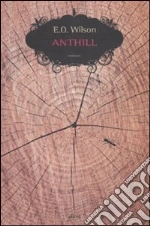 Title :
Anthill
Title :
AnthillAuthor: Wilson Edward O. Publisher: Elliot Salutato unanimemente in America come uno dei migliori e più importanti romanzi dell'anno, Anthill narra le avventure di un moderno Huckleberry Finn, Raff Cody. I1 suo amore pazzo, improbabile e più forte di ogni ostacolo per le formiche e il regno naturale a cui appartengono trasformerà per sempre la vita del ragazzo e quella degli abitanti di Nokobee County, una magnifica riserva naturale insidiata dalle speculazioni edilizie e da affaristi senza scrupoli. Parallela alle avventure di Raff, scorre epica e potente la saga di alcune colonie di formiche della stessa riserva di Nokobee, vera e propria epopea di guerre, conquiste, creazione e distruzione, alla quale il giovane assiste affascinato e meravigliato. Edward O. Wilson, due volte Premio Pulitzer per la propria opera scientifica, in questo suo primo magnifico romanzo ci racconta l'insolita storia di un ragazzo coraggioso e idealista che cresce determinato a salvare il mondo dal suo nemico più grande: l'Uomo. Romanzo di formazione, parabola ecologista e riflessione sul rapporto tra uomo e natura, Anthill è un libro magico e indimenticabile, monito e fonte di grande ispirazione per il futuro stesso del nostro pianeta. € 18,50
|
|
2008 |
 Title :
La creazione
Title :
La creazioneAuthor: Wilson Edward O. Publisher: Adelphi Il ruolo delle formiche nella biosfera - dice Edward Wilson - è così importante che l'umanità forse non potrebbe sopravvivere senza di esse. Ma l'umanità, prigioniera della propria strategia arcaica della sopravvivenza a breve termine, è ancora troppo concentrata su se stessa e sui propri bisogni, e sta distruggendo la natura con la forza di un meteorite. Entro la fine del secolo, metà di tutte le specie potrebbero essere definitivamente uscite di scena. Avrà allora inizio quella che potrebbe venire ricordata un giorno come l'Era eremozoica - l'Età della Solitudine. I costi materiali e spirituali per le generazioni future rischierebbero di essere sbalorditivi, ma a scongiurare tutto questo non bastano mere considerazioni utilitaristiche. Per risultare realmente efficace, la strategia di conservazione deve tentare di collegare l'approccio razionale tipico della scienza con quello più emotivo e spirituale offerto dalla nostra innata 'biofilia', tendenza che permane, seppure atrofizzata, persino nei bozzoli artificiali in cui scorre la nostra esistenza urbana e che potrebbe diventare il fondamento di una nuova etica. Wilson per la sua perorazione ha scelto la singolare forma di una lettera indirizzata a un immaginario uomo di chiesa, nella speranza che religione e scienza, 'le forze più potenti nel mondo di oggi', possano incontrarsi 'al di qua della metafisica' per salvare il futuro della vita sulla Terra. € 25,00
Scontato: € 23,75
|
|
|
2007 |
 Title :
The Neuroscience of Fair Play
Title :
The Neuroscience of Fair PlayAuthor: Pfaff Donald W., Wilson Edward O. (FRW) Publisher: Dana Pr We remember the admonition of our mothers: “Treat others as you want them to treat you.” But what if being nice was something we were inclined by nature to do anyway? Renowned neuroscientist Donald Pfaff upends our entire understanding of ethics and social contracts with an intriguing proposition: the Golden Rule is hardwired into the human brain. Pfaff, the researcher who first discovered the connections between specific brain circuits and certain behaviors, contends that the basic ethics governing our everyday lives can be traced directly to brain circuitry. Writing with popular science journalist Sandra J. Ackerman, he explains in this clear and concise account how specific brain signals induce us to consider our actions as if they were directed at ourselves—and subsequently lead us to treat others as we wish to be treated. Brain hormones are a part of this complicated process, and The Neuroscience of Fair Play discusses how brain hormones can catalyze behaviors with moral implications in such areas as self-sacrifice, parental love, friendship, and violent aggression. Drawing on his own research and other recent studies in brain science, Pfaff offers a thought-provoking hypothesis for why certain ethical codes and ideas have remained constant across human societies and cultures throughout the world and over the centuries of history. An unprecedented and provocative investigation, The Neuroscience of Fair Play offers a new perspective on the increasingly important intersection of neuroscience and ethics. € 18,70
|
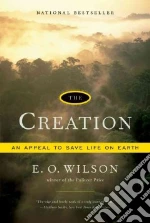 Title :
The Creation
Title :
The CreationAuthor: Wilson Edward O. Publisher: W W Norton & Co Inc The Pulitzer Prize-winning author of € 13,40
|
|
2006 |
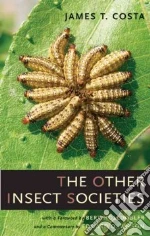 Title :
The Other Insect Societies
Title :
The Other Insect SocietiesAuthor: Costa James T., Holldobler Bert (FRW), Wilson Edward O. (CON) Publisher: Belknap Pr Asked to name an insect society, most of us--whether casual or professional students of nature--quickly point to one of the so-called eusocial marvels: the ant colony, the beehive, the termite mound, the wasp nest. Each is awe-inspiring in its division of labor--collective defense, foraging, and nestbuilding. Yet E. O. Wilson cautioned back in 1971 that sociality should be defined more broadly, 'in order to prevent the arbitrary exclusion of many interesting phenomena.' Thirty-five years later, James T. Costa gives those interesting phenomena their due. He argues that, in trying to solve the puzzle of how highly eusocial behaviors evolved in a few insect orders, evolutionary biologists have neglected the more diverse social arrangements in the remaining twenty-eight orders--insect societies that don't fit the eusocial schema. Costa synthesizes here for the first time the scattered literature about social phenomena across the arthropod phylum: beetles and bugs, caterpillars and cockroaches, mantids and membracids, sawflies and spiders. This wide-ranging tour takes a rich narrative approach that interweaves theory and data analysis with the behavior and ecology of these remarkable groups. This comprehensive treatment is likely to inspire a new generation of naturalists to take a closer look. € 95,60
|
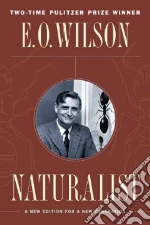 Title :
Naturalist
Title :
NaturalistAuthor: Wilson Edward O. Publisher: Island Pr Edward O. Wilson -- University Professor at Harvard, winner of two Pulitzer prizes, eloquent champion of biodiversity -- is arguably one of the most important thinkers of the twentieth century. His career represents both a blueprint and a challenge to those who seek to explore the frontiers of scientific understanding. Yet, until now, little has been told of his life and of the important events that have shaped his thought.In Naturalist, Wilson describes for the first time both his growth as a scientist and the evolution of the science he has helped define. He traces the trajectory of his life -- from a childhood spent exploring the Gulf Coast of Alabama and Florida to life as a tenured professor at Harvard -- detailing how his youthful fascination with nature blossomed into a lifelong calling. He recounts with drama and wit the adventures of his days as a student at the University of Alabama and his four decades at Harvard University, where he has achieved renown as both teacher and researcher.As the narrative of Wilson's life unfolds, the reader is treated to an inside look at the origin and development of ideas that guide today's biological research. Theories that are now widely accepted in the scientific world were once untested hypotheses emerging from one mans's broad-gauged studies. Throughout Naturalist, we see Wilson's mind and energies constantly striving to help establish many of the central principles of the field of evolutionary biology.The story of Wilson's life provides fascinating insights into the making of a scientist, and a valuable look at some of the most thought-provoking ideas of our time. € 27,70
|
|
2005 |
 Title :
The Literary Animal
Title :
The Literary AnimalAuthor: Gottschall Jonathan (EDT), Wilson David Sloan (EDT), Wilson Edward O. (FRW) Publisher: Northwestern Univ Pr In recent years, articles in major periodicals from the New York Times Magazine to the Times Literary Supplement have heralded the arrival of a new school of literary studies that promises-or threatens-to profoundly shift the current paradigm. This revolutionary approach, known as Darwinian literary studies, is based on a few simple premises: evolution has produced a universal landscape of the human mind that can be scientifically mapped; these universal tendencies are reflected in the composition, reception, and interpretation of literary works; and an understanding of the evolutionary foundations of human behavior, psychology, and culture will enable literary scholars to gain powerful new perspectives on the elements, form, and nature of storytelling. The goal of this book is to overcome some of the widespread misunderstandings about the meaning of a Darwinian approach to the human mind generally, and literature specifically. The volume brings together scholars from the forefront of the new field of evolutionary literary analysis-both literary analysts who have made evolution their explanatory framework and evolutionist scientists who have taken a serious interest in literature-to show how the human propensity for literature and art can be properly framed as a true evolutionary problem. Their work is an important step toward the long-prophesied synthesis of the humanities and what Steven Pinker calls 'the new sciences of human nature.' € 28,10
|
 Title :
From So Simple a Beginning
Title :
From So Simple a BeginningAuthor: Darwin Charles, Wilson Edward O. Publisher: W W Norton & Co Inc Never before have the four great works of Charles Darwin—Voyage of the H.M.S. Beagle (1845), The Origin of Species (1859), The Descent of Man (1871), and The Expression of Emotions in Man and Animals (1872)—been collected under one cover. Undertaking this challenging endeavor 123 years after Darwin's death, two-time Pulitzer Prize winner Edward O. Wilson has written an introductory essay for the occasion, while providing new, insightful introductions to each of the four volumes and an afterword that examines the fate of evolutionary theory in an era of religious resistance. In addition, Wilson has crafted a creative new index to accompany these four texts, which links the nineteenth-century, Darwinian evolutionary concepts to contemporary biological thought. Beautifully slipcased, and including restored versions of the original illustrations, From So Simple a Beginning turns our attention to the astounding power of the natural creative process and the magnificence of its products. € 53,60
|
 Title :
For Love of Insects
Title :
For Love of InsectsAuthor: Eisner Thomas, Wilson Edward O. (FRW) Publisher: Belknap Pr Imagine beetles ejecting defensive sprays as hot as boiling water; female moths holding their mates for ransom; caterpillars disguising themselves as flowers by fastening petals to their bodies; termites emitting a viscous glue to rally fellow soldiers--and you will have entered an insect world once beyond imagining, a world observed and described down to its tiniest astonishing detail by Thomas Eisner. The story of a lifetime of such minute explorations, For Love of Insects celebrates the small creatures that have emerged triumphant on the planet, the beneficiaries of extraordinary evolutionary inventiveness and unparalleled reproductive capacity. To understand the success of insects is to appreciate our own shortcomings, Eisner tells us, but never has a reckoning been such a pleasure. Recounting exploits and discoveries in his lab at Cornell and in the field in Uruguay, Australia, Panama, Europe, and North America, Eisner time and again demonstrates how inquiry into the survival strategies of an insect leads to clarifications beyond the expected; insects are revealed as masters of achievement, forms of life worthy of study and respect from even the most recalcitrant entomophobe. Filled with descriptions of his ingenious experiments and illustrated with photographs unmatched for their combination of scientific content and delicate beauty, Eisner's book makes readers participants in the grand adventure of discovery on a scale infinitesimally small, and infinitely surprising. € 39,30
|
 Title :
The New Atlas of Planet Management
Title :
The New Atlas of Planet ManagementAuthor: Myers Norman (EDT), Kent Jennifer (EDT), Wilson Edward O. (FRW) Publisher: Univ of California Pr The New Atlas of Planet Management was regarded as the most groundbreaking survey of the state of our planet when it was first published in 1984. After over twenty years in print, it has become the bible of the environmental movement and the definitive guide to a planet in critical transition. Regularly featured among the top ten books on the environment, the Atlas has been read by millions of people and translated into more than a dozen languages. This enlarged edition brings the classic reference up-to-date. Thoroughly revised with the latest figures and analysis, fresh full-color and easy-to-read graphics, an expanded format, and a wealth of current environmental and political topics that have arisen during the previous two decades, The New Atlas of Planet Management will equip a further generation of readers with information to face the challenges of the new millennium. THIS REVISED EDITION CONTAINS: *Updated chapters on land, oceans, elements, evolution, humankind, civilization, and management *New sections on consumption, globalization, environmental security, refugees, international terrorism, the rise of information technology, china, and more *Powerful new illustrations that convey a wealth of information Copub: Gaia Books € 53,30
|
 Title :
Genes, Mind, And Culture
Title :
Genes, Mind, And CultureAuthor: Lumsden Charles J., Wilson Edward O. Publisher: World Scientific Pub Co Inc € 168,30
|
|
|
2004 |
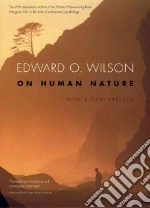 Title :
On Human Nature
Title :
On Human NatureAuthor: Wilson Edward O. Publisher: Harvard Univ Pr In his new preface E. O. Wilson reflects on how he came to write this book: how The Insect Societies led him to write Sociobiology, and how the political and religious uproar that engulfed that book persuaded him to write another book that would better explain the relevance of biology to the understanding of human behavior. € 30,90
|
 Title :
The Man Who Loved Wasps
Title :
The Man Who Loved WaspsAuthor: Evans Howard Ensign, Wilson Edward O. (FRW), Evans Mary Alice Publisher: Big Earth Pub They called him by name from their hiding places, and he followed into the garden, the desert, the meadow, the swamp, the forest, and the urban jungle. Evans was a master entomologist who seems only to have been truly comfortable in places where the bugs called; there he found his beauty, his magic and his poetry. In this collection, which he completed just before his death at 83, it appears Evans knew all 900,000 species of his gems that to others were only insects, along with the lowly magpie and the birds of Australia as well. Annotation ©2005 Book News, Inc., Portland, OR (booknews.com) € 15,60
|

|

|

|

|